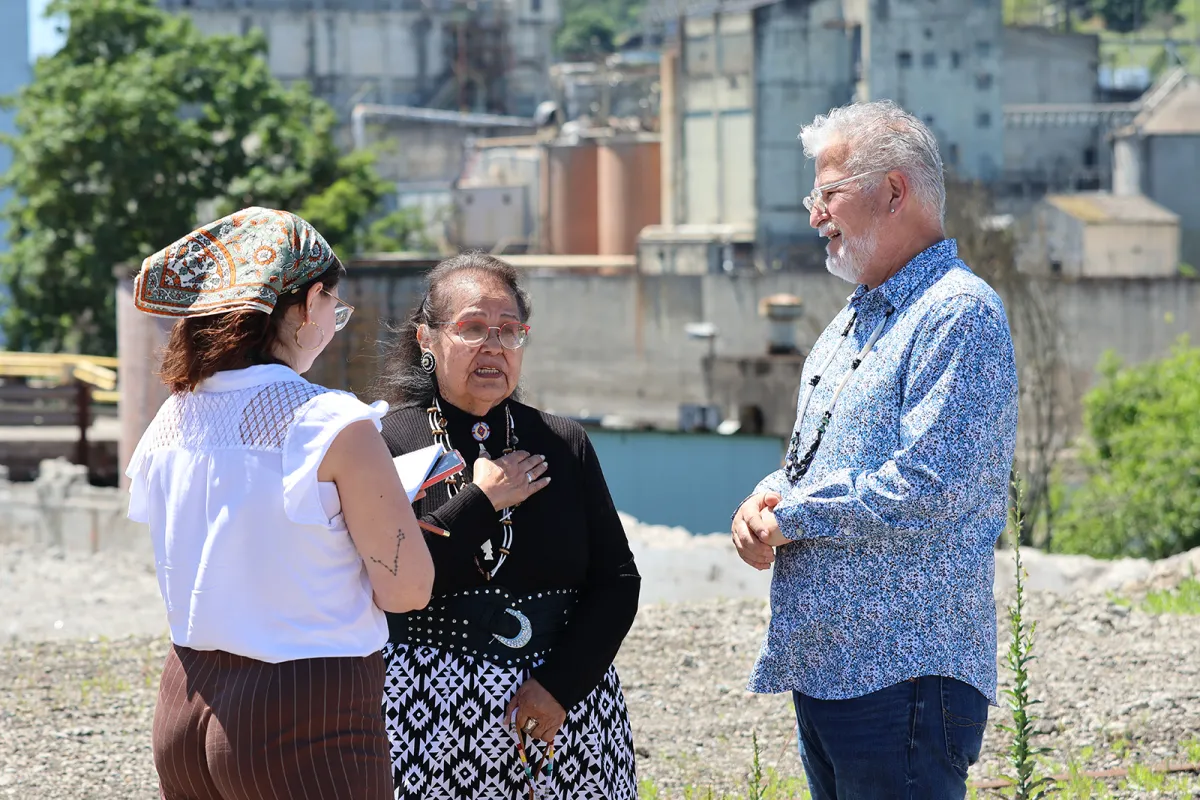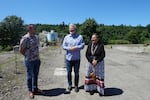This story originally appeared on Underscore Native News.

Confederated Tribes of Grand Ronde Chairwoman Cheryle Kennedy and Grand Ronde Councilman Jon George speak to Underscore News reporter Nika Bartoo-Smith on June 5, 2024 at the site where the tribe is working to build Tumwata Village.
Karina Brown / Underscore News
Marred by over 150 years of colonization and industrialization, few people know the wonders of Willamette Falls, the second largest waterfall by volume in North America.
A culturally and historically significant gathering sight for Native nations throughout the region since time immemorial, the Confederated Tribes of Grand Ronde is working on a project on the east side of the falls at the old Blue Heron Paper Mill site. The new name is tumwata village -— tumwata is Grand Ronde’s name for Willamette Falls. Tum means heart, like the ‘tum tum’ of a heartbeat.
“Anyone who comes here to visit it will feel that connection to the falls,” said Jon George, councilman for the Confederated Tribes of Grand Ronde. “To feel the power of it, the spirituality of it, the connection, and to see that things have been restored.”
Though still roughly a decade away from project completion, demolition is well underway. Ryan Webb, engineering and planning manager for the project, is hopeful that construction could begin as soon as next summer.

Crews worked to demolish buildings at the former Blue Heron Paper Mill on June 5, 2024. The Confederated Tribes of Grand Ronde are working to create tumwata village there, a mixture of public, cultural and commercial use overlooking Willamette Falls.
Karina Brown / Underscore News
tumwata village
As of June, about half of the old industrial buildings had been demolished, according to Webb. Construction plans include a mixture of public, cultural and commercial use.
Grand Ronde purchased the Blue Heron Mill during the summer of 2019. Blue Heron closed its doors in 2011. The 23-acre site originally had over 55 buildings and structures. To date, 25 have been removed. Before beginning construction, all the old buildings must first be demolished, which is no easy task.
“The priorities that tribal council gave us when it came to restoring this site was healing and restoring. So bringing back native vegetation on the shoreline, and really bringing back old river channels,” Webb said. “And then public access. We’ve been very intentional with our development plans that public access isn’t just one location when people get to the site, it is access throughout the site.”

Demolition crews exposed the innards of the former administration building at the former Blue Heron Paper Mill on June 5, 2024. The Confederated Tribes of Grand Ronde are working to create tumwata village there, a mixture of public, cultural and commercial use overlooking Willamette Falls.
Karina Brown / Underscore News
Design plans for tumwata village feature space for nearly a dozen new buildings which will include offices, retail space, residential buildings and a hotel. The hotel will look out directly over the falls, with all the buildings ranging in size from one to five stories, according to the plans.
Additionally, restored banks and water channels will be connected to a river walk leading to direct views of the falls. The plan also shows a pedestrian and bicycle bridge over the railroad and 99E.
Native plants and Indigenous art featuring Grand Ronde artists will be present throughout tumwata village. Another element that is particularly exciting to some Grand Ronde tribal members is a plank house nestled in next to the lagoon — a pool of calm water in a small alcove behind the falls.
“I’m here to see the day our canoes land on the shore by the plank house and celebrate,” said George.

Confederated Tribes of Grand Ronde Chairwoman Cheryle Kennedy, Grand Ronde Councilman Jon George and Ryan Webb, engineering and project manager for the tribe’s tumwata village project were at the construction site on June 5, 2024.
Karina Brown / Underscore News
Transformation at the falls
Across the river on the west side of the falls, the Willamette Falls Trust is also planning a public access project. Originally involved with that project, Grand Ronde withdrew from the Trust in 2021.
The first week of June, the Trust announced that former Oregon Governor Kate Brown has stepped in as the new president for the nonprofit organization.
“Kate has a lot of knowledge,” said Grand Ronde Chairwoman Cheryle Kennedy, who served on the Spirit Mountain Community Fund with Brown. “You just have to really respect her knowledge as she moves forward. I spoke with her and congratulated her [about her new role].”
In an interview with Underscore News/ICT, Brown expressed that there is always a seat at the table for Grand Ronde to rejoin the Trust.
“Well, we’re always open to communication,” Chairwoman Kennedy told Underscore News/ICT. “We respectfully thank the tribes that were at the table and helping to talk about what they’d like to see. So we are paying attention to that.”
Some Native nations in the region have expressed concerns about an agreement between Grand Ronde and the Oregon Department of Fish and Wildlife inked in August 2023. For some, this agreement seemed to state that Grand Ronde has access to the falls in a way that other Native nations in the region, namely the four Columbia River Treaty Tribes, do not.
Grand Ronde has said that the agreement does not impact treaty rights of any of the other Native nations, and points to language in the agreement specifically excluding “state-owned land” at the falls.
Portland General Electric, which is working with Willamette Falls Trust on its public access project, is currently locked in litigation with the state of Oregon and Grand Ronde over a fishing platform that Grand Ronde owns at the falls.
In May, the Confederated Tribes of Warm Springs, a member tribe of the Willamette Falls Trust, asked the state to repeal its agreement with Grand Ronde.
Kennedy and George declined to answer questions about Grand Ronde’s agreement with the state of Oregon or PGE’s lawsuit over the fishing platform.

Confederated Tribes of Grand Ronde Chairwoman Cheryle Kennedy, Grand Ronde Councilman Jon George and Ryan Webb, engineering and project manager for the tribe’s tumwata village project were at the construction site on June 5, 2024.
Karina Brown / Underscore News
'Healing of the land’
For Grand Ronde, creating tumwata village is about both public access and restoring a culturally important site, according to Kennedy. The falls is a natural area that has been left wounded after battling the encroachment of industrialization.
“It’s really healing of the land and for the return of our people so that those who wish to be here can be here,” Kennedy said.
Over 150 years of industrial use, most recently with the Blue Heron Paper Mill, has left the 23-acre site in a state of disrepair. Environmental challenges include degraded habitat, polluted soils, hazardous building materials and limited shoreline, which impacts migrating fish, according to the design plans for tumwata village.
Grand Ronde plans to work to improve water quality and fish habitat through environmental rehabilitation. There is no exact estimate for timeline completion of the project – perhaps decades down the line, according to Webb. Part of why it will take so long is because in order for construction to begin, the crew must first focus on demolition and environmental cleanup, he said.
While construction is yet to begin, Grand Ronde is busy visioning a future for tumwata village.
“We have to construct it in that way to give everyone this experience,” George said. “Even just coming upon the land and walking down the streets with beautiful native plants and trees and large plazas to gather.”

Construction cranes scooped busily at the former Blue Heron Paper Mill during demolition on June 5, 2024.
Karina Brown / Underscore News
Standing at the half-demolished site today, Willamette Falls can be seen only at a distance, blocked by the view of old buildings waiting to come down. But Grand Ronde is working to change that and create a place for Native people and the broader community to once again enjoy an awe-inspiring view of the falls from the east side of the river.
Underscore Native News is a nonprofit investigative newsroom committed to Indigenous-centered reporting in the Pacific Northwest. We are supported by foundations and donor contributions. Follow Underscore on Facebook, Twitter, Instagram and TikTok.


